Puerto Rico Leads U.S. in Vaccination Rates for COVID-19

People line up outside the Puerto Rico Convention Center for the first mass Covid-19 vaccination event in San Juan, Puerto Rico on March 31, 2021. (Photo by Ricardo ARDUENGO / AFP) (Photo by RICARDO ARDUENGO/AFP via Getty Images)
It might have been a rough few months for Puerto Rico at the start of the pandemic, but the island can now say it’s one of the leaders in helping to curb the spread of the coronavirus.
According to the White House, Puerto Rico leads all states and U.S. territories in COVID-19 vaccination rates. As of Monday (October 18), Puerto Rico has administered more than 4.8 million vaccine doses to 3.2 million individuals, according to the Centers for Disease Control and Prevention (CDC). This puts Puerto Rico’s population of vaccinated residents at 72 percent.
In contrast, the state with the lowest vaccination rate in the U.S. is West Virginia at 41 percent, followed by Idaho and Wyoming at 43 percent. Vermont has the best rate on the mainland, with a vaccination rate of 71 percent.
“This means hundreds, if not thousands of lives [were] saved,” Daniel Colón Ramos, professor of Neuroscience and Cell Biology at Yale University School of Medicine, told the Miami Herald. “There are people who are literally living their lives with normalcy who would not be here if it weren’t for these efforts.”
In the last week, Puerto Rico has reported 18 cases of COVID-19 per 100,000 residents. In comparison, Florida, with a vaccination rate of 59 percent, has reported nearly 80 cases per 100,000 in that same period.
Puerto Rico’s numbers are impressive, especially since it had a low per capita testing rate and no contact tracing system at the start of the pandemic. It was a challenge, too, because its health care industry is still suffering from the damage Hurricane Maria caused in 2017. Colón Ramos wonders if the natural disaster contributed to Puerto Rico’s efforts to combat the virus.
“I do not wish those tragedies on my people, but if they had not happened, I wonder if the tragedy of the pandemic would have been greater,” Colón-Ramos said. “Because if not, the people would not have taken it seriously, and the closure of the country would have been protested.”